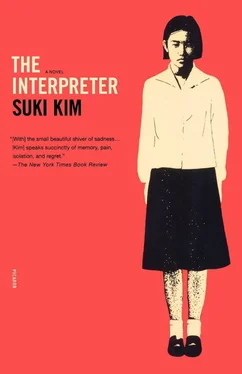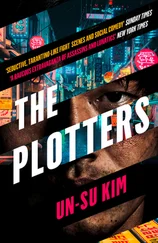Suzy is also losing patience, adding at end of the lawyer’s question, Please say more. This might be your last chance.
“I was making fruit cups and I saw the girl stealing.”
“And then what happened?”
“I stabbed her in her shoulder with the knife I was using to cut fruit.”
“Mrs. Choi, isn’t it true that the girl punched you repeatedly before you pulled out the knife?”
“Objection!” the INS attorney barks. “The counsel is leading the respondent. Besides, the respondent has already served her sentence. The respondent is not summoned to this court for her crime; she’s here because she is deportable!”
“Your Honor, it is very relevant. Her crime is exactly why she has been deemed deportable.”
“Overruled, but, Counsel, I will not allow these types of questions for much longer.” A warning. Judge Williams wants this show to be over with. Three more cases to go today: two asylum petitions, one status adjustment. Pardon them one year, detention centers get jammed tenfold in the following year. Is America up for grabs? Judge Williams adjusts his glasses, which slide down again almost immediately.
“Thank you, Your Honor. Mrs. Choi, did the girl you claimed to have stabbed provoke you in any way? Such as insulting you with racial slurs or attacking you physically?”
“I don’t remember.”
“Mrs. Choi, if you would please look at Exhibit A, in front of you, which is the transcript of your testimony from the criminal hearing that took place on January 30, 1998, you will find that you testified that the sixteen-year-old victim had stolen a six-pack of beer and a case of cherries and then called you ‘Fucking Chink’ several times, among other racial slurs, and then proceeded to punch you repeatedly in the face. Is that correct?”
It is then that Suzy remembers the headline from a few years back. “KOREAN WOMAN STABS BLACK TEENAGE GIRL FOR CHERRIES.” It was all over the papers. The girl was out of the hospital in a few weeks, but boycotts spread like wildfire against Korean fruit-and-vegetable stores in Harlem and the Bronx. The New York Post called it the “Return of Rodney King”; Reverend Al Sharpton exhorted his people to fight back; 1010-WINS updated the news every half-hour. Suzy remembers the photograph of the distraught woman surrounded by a mob of reporters. Is that why she seems familiar? Where are those reporters now? Do people forget so quickly?
“Mrs. Choi, your silence is not helping,” Judge Williams interrupts finally. “You do realize that, in the case of a green-card holder, an aggravated felony is grounds for removal?”
Without a glance at the bench, Mrs. Choi responds, “I’ve served almost three years in jail. I’ve lost everything. My husband, my daughter, my store. If that didn’t kill me, nothing else will.” It is the most she’s spoken so far. But self-destructive. No use confessing her heart to a judge who never grants relief, or to the trial attorney sent by the INS. Yet Suzy has no choice but to translate.
Her lawyer then puts the cap back on his pen with an obvious look of irritation and fatigue. “I have no further questions,” he sighs. Pointless trying to establish her as the victim, as the one who’s lived here for a quarter of a century, whose husband and daughter are still very much alive in this country, for whom being removed permanently means being torn away from a home.
Then the INS attorney perks up, grabbing her notes: “I have a few questions.” Suzy winces as she translates her words—the trial attorney from the INS, the source of everything that had gone wrong with her parents. “Madam, where is your daughter?”
Mrs. Choi then raises her eyes for the very first time. Dead eyes. Nothing there, Suzy notices. Nothing left over.
“Isn’t it true that she ran away from home when she was seventeen?”
The question shoots out of nowhere and sticks. Suzy stumbles, as though it is her mother being examined, accused, sentenced. Isn’t it true that your daughter abandoned you because she couldn’t stand you?
“Isn’t it also true that, before she left home, she had filed a complaint against your husband, Mr. Choi, for physical abuse, in which she alleged that he beat you as well?”
Mrs. Choi’s face reveals nothing. Theirs was not a happy home, obviously, which is exactly what the INS attorney wants Judge Williams to consider. No one’s breaking their home. They did that for themselves. Green cards were never meant for such undesirables.
“And isn’t it also true that you have not once seen your husband, Mr. Choi, since the day you stabbed the girl in your store, almost three years ago?” The INS attorney fixes her gaze on Mrs. Choi for a few seconds, and then turns to Judge Williams. “Your Honor, I have no further questions.”
The INS attorney spoke the truth on her cell phone earlier. Judge Williams’s ruling is only a formality. Relief was never a possibility. Deportation had begun the minute she stabbed that girl. She should’ve known better. Immigrants are not Americans. Permanent residency is never permanent. Anything can happen. A teenage thief on one unlucky night. A pair of INS informers eyeing your store. A secret murder that is not so secret anymore. And Suzy, sitting across from the INS attorney on the twelfth floor of the INS building, about to translate a deportation sentence for a Korean woman exactly her mother’s age.
When Judge Williams announces the removal date, Suzy chokes. Her voice is suddenly gone. She inhales deeply and then swallows once, twice. All faces are on her. Then she hears it again. The quiet murmur from Mrs. Choi.
Namuamitabul Kuansaeumbosal.
It’s the Buddhist chant Mom used to utter when Suzy got sick. It always made her feel better. A lullaby. A dead woman’s song.
“HELLO, this is the Interpreter Hotline Services.”
“Hello, this is a message for Korean interpreter Suzy Park.”
“Hello, Suzy Park, please report to Job Number 009.”
She presses “Delete” after each message. It is no longer possible. An interpreter cannot pick sides. Once she does, something slips, a certain fine cord that connects English to Korean and Korean to English without hesitation, or a hint of anger.
For the past three days, the phone kept ringing while she lay in bed. Michael, pleading into her machine. Even in her deepest dreams, she heard his sighs. He would fume, demand that she answer. Then, half an hour later, a softer, sweeter, Suzy, please. His calls stopped overnight, which could mean only one thing. He must be back in Connecticut. Even Michael would not dare calling his mistress during a Thanksgiving dinner.
A half-dozen messages have been left by Detective Lester. Suddenly he is eager to get to the bottom of the case. With each call, he seems increasingly confident that he is closing in, although the three ex-KK suspects are still claiming that it was a setup. He has no doubt that he could convict the gang of firstdegree murder, although he seems unaware of their link to the Korean grocers. He never lets Suzy in on her parents’ backdealings with the INS, or with the police.
The girl from the accountant’s office has called more than once. “Grace is missing,” she squealed into the machine. “Grace still hasn’t come by to sign the papers. Please call us back as soon as possible.”
What is curious is how unmoved Suzy is, how unmotivated she is to pick up the phone. Instead, she is overcome by sleep. Her insomnia seems to have been miraculously cured. All she does now is sleep. No cigarette break. No water break. In between come those voices trailing off into the machine, voices from far away, voices belonging to dreams. The dream of the interpreter who no longer remembers her language.
Читать дальше












